人教高中英语选修七Unit 2 Robots 课文分析satisfaction-guaranteed 课件 (46张PPT)
文档属性
| 名称 | 人教高中英语选修七Unit 2 Robots 课文分析satisfaction-guaranteed 课件 (46张PPT) |
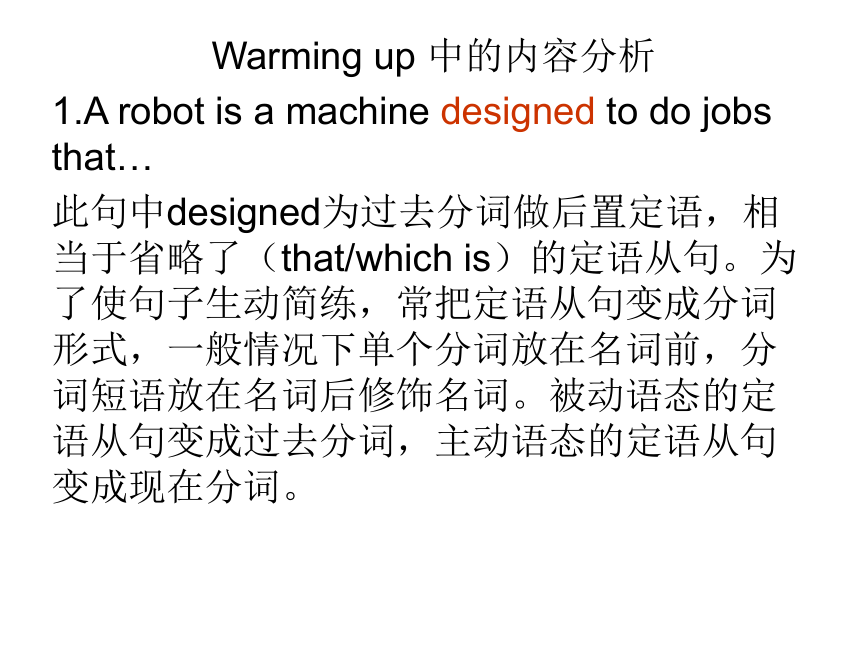
|
|
| 格式 | zip | ||
| 文件大小 | 6.7MB | ||
| 资源类型 | 教案 | ||
| 版本资源 | 人教版(新课程标准) | ||
| 科目 | 英语 | ||
| 更新时间 | 2020-05-04 13:23:42 | ||
图片预览

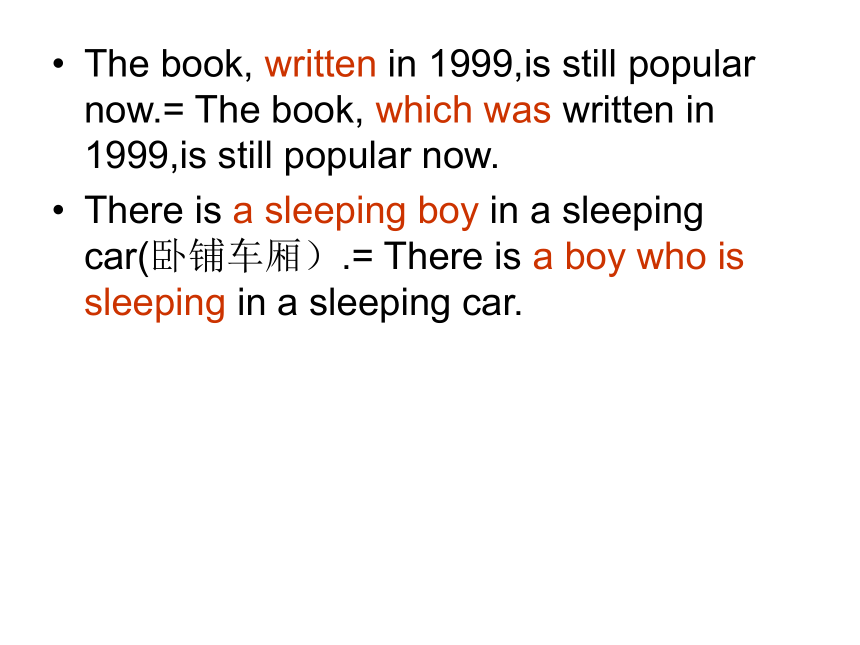
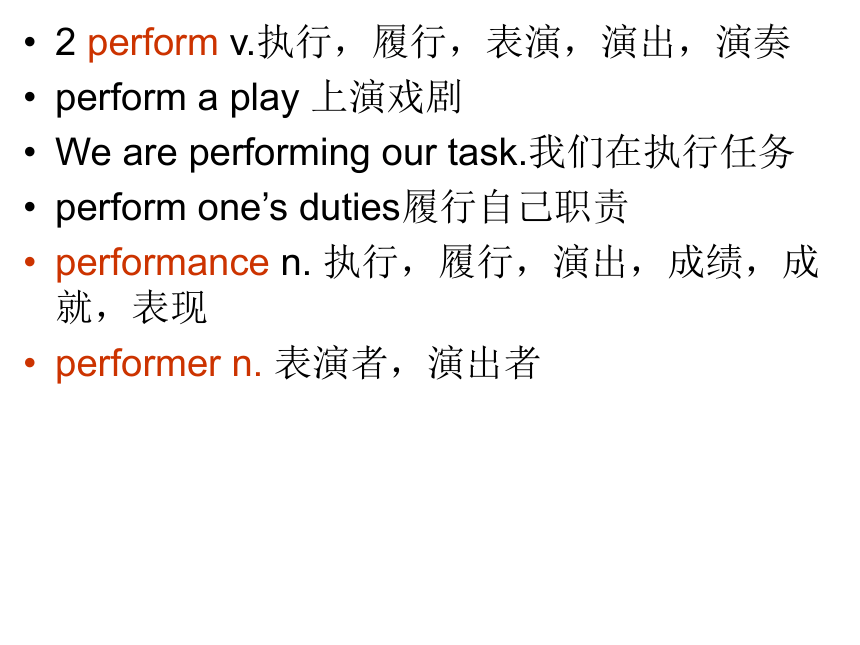
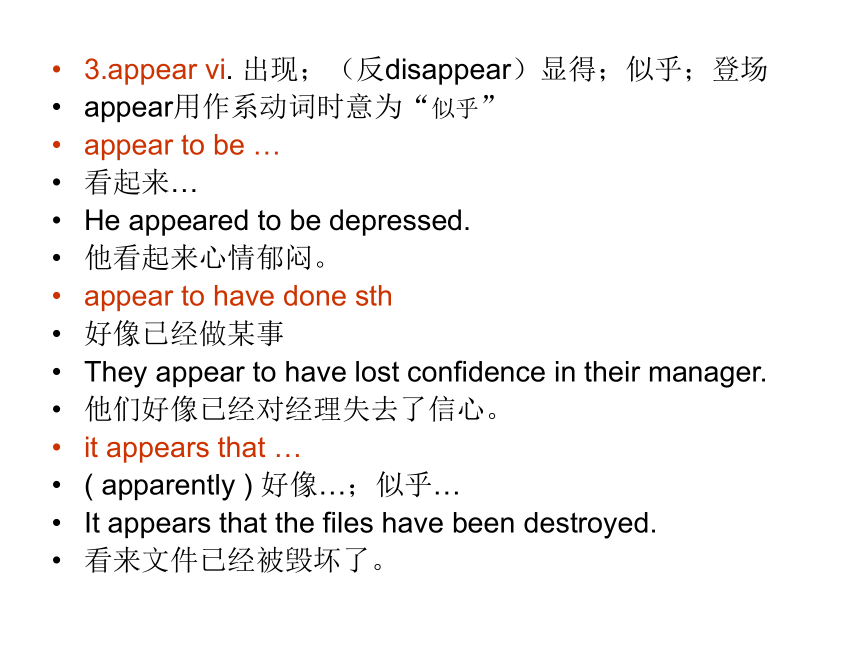
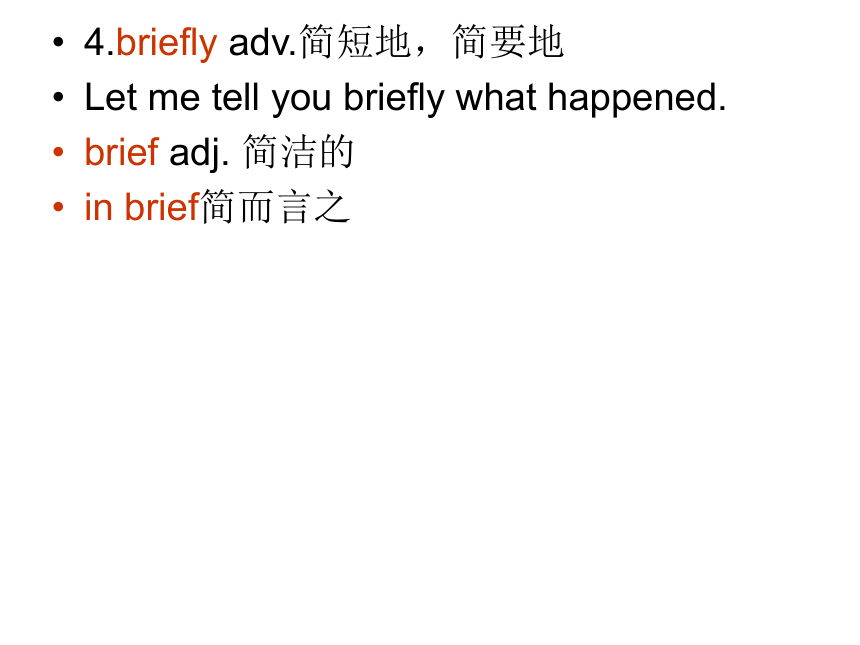
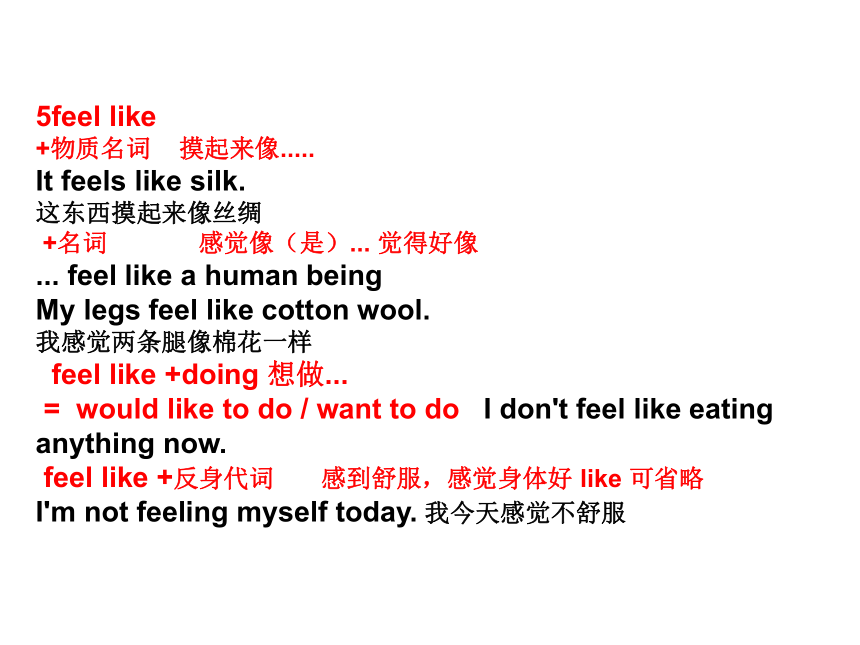
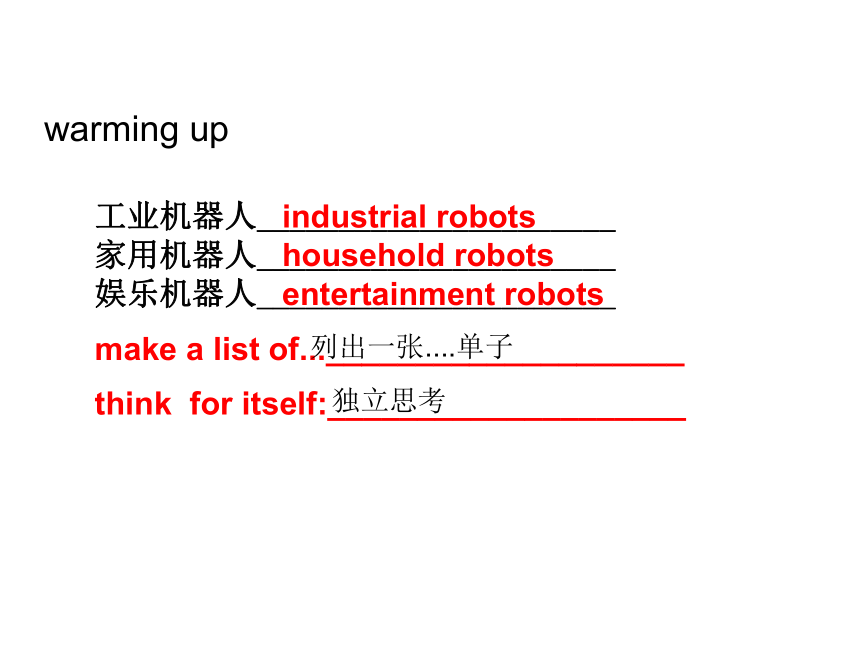


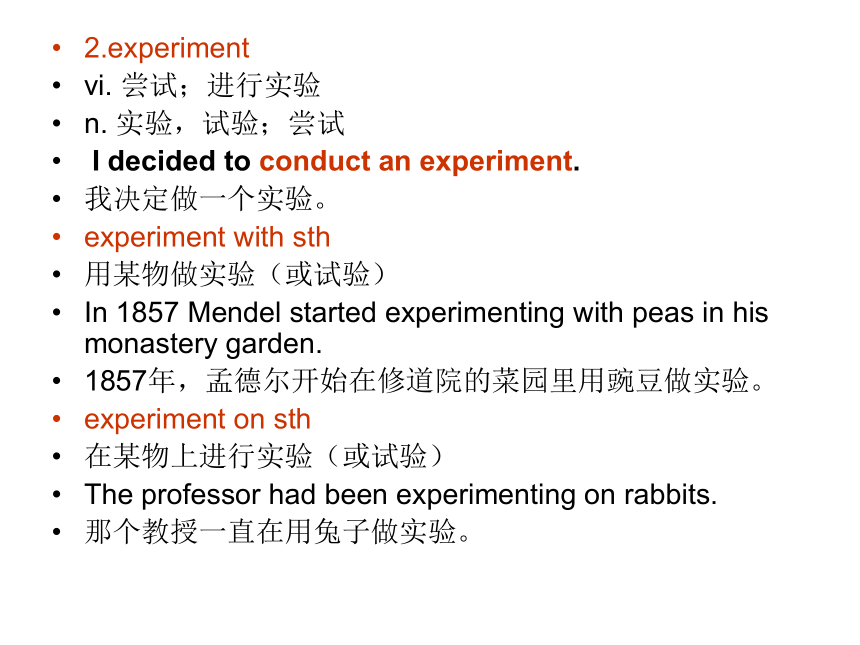
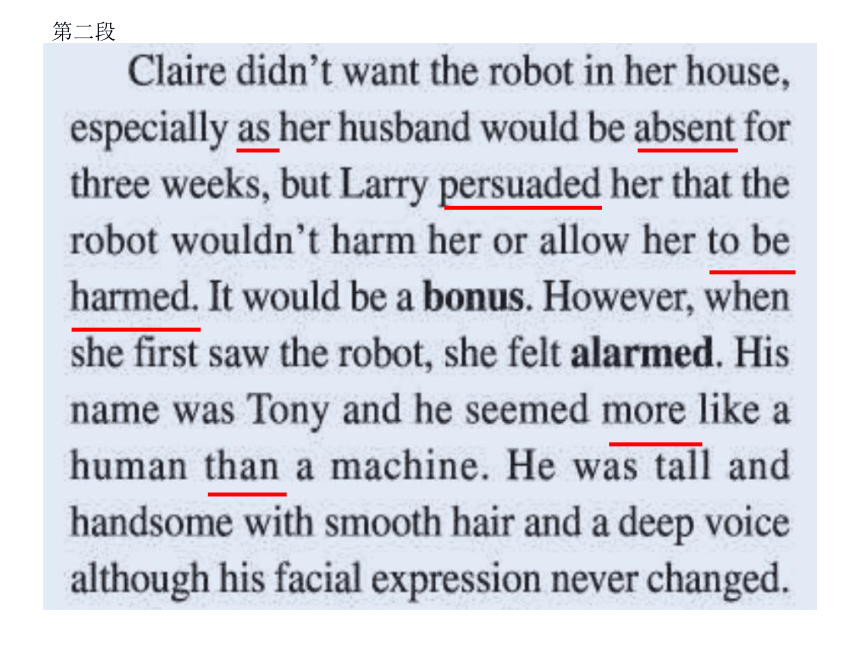
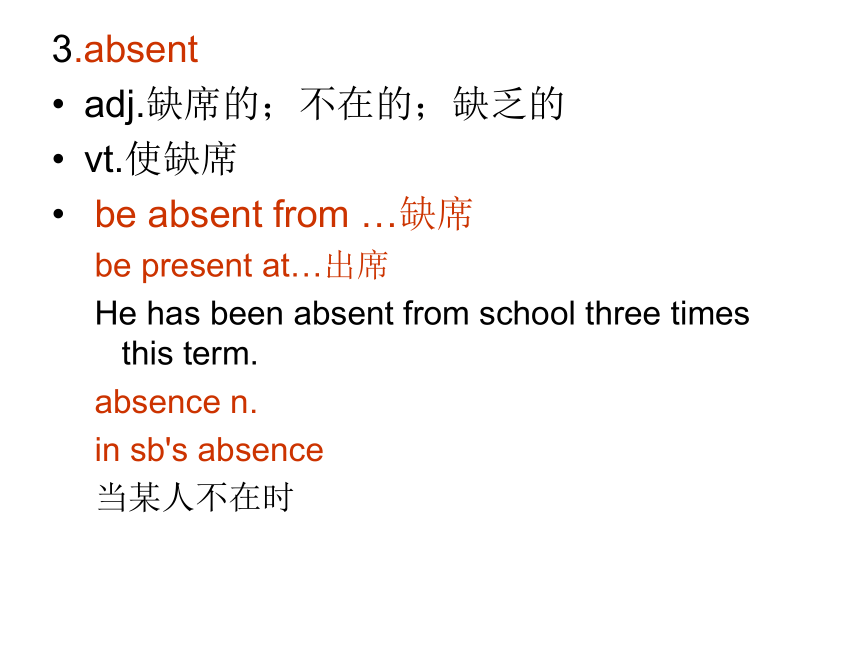
文档简介
(共71张PPT)
Warming up 中的内容分析
1.A robot is a machine designed to do jobs that…
此句中designed为过去分词做后置定语,相当于省略了(that/which is)的定语从句。为了使句子生动简练,常把定语从句变成分词形式,一般情况下单个分词放在名词前,分词短语放在名词后修饰名词。被动语态的定语从句变成过去分词,主动语态的定语从句变成现在分词。
The book, written in 1999,is still popular now.= The book, which was written in 1999,is still popular now.
There is a sleeping boy in a sleeping car(卧铺车厢).= There is a boy who is sleeping in a sleeping car.
2 perform v.执行,履行,表演,演出,演奏
perform a play 上演戏剧
We are performing our task.我们在执行任务
perform one’s duties履行自己职责
performance n. 执行,履行,演出,成绩,成就,表现
performer n. 表演者,演出者
3.appear vi. 出现;(反disappear)显得;似乎;登场
appear用作系动词时意为“似乎”
appear to be …
看起来…
He appeared to be depressed.
他看起来心情郁闷。
appear to have done sth
好像已经做某事
They appear to have lost confidence in their manager.
他们好像已经对经理失去了信心。
it appears that …
( apparently )?好像…;似乎…
It appears that the files have been destroyed.
看来文件已经被毁坏了。
4.briefly adv.简短地,简要地
Let me tell you briefly what happened.
brief adj. 简洁的
in brief简而言之
5feel like
+物质名词 摸起来像.....
It feels like silk.
这东西摸起来像丝绸
+名词 感觉像(是)... 觉得好像
... feel like a human being
My legs feel like cotton wool.
我感觉两条腿像棉花一样
feel like +doing 想做...
= would like to do / want to do I don't feel like eating anything now.
feel like +反身代词 感到舒服,感觉身体好 like 可省略
I'm not feeling myself today. 我今天感觉不舒服
warming up
工业机器人______________________
家用机器人______________________
娱乐机器人______________________
industrial robots
household robots
entertainment robots
make a list of...____________________
列出一张....单子
think for itself:____________________
独立思考
课文部分语言点
第一段
1. guarantee?
n. 保证,担保;保证人,保证书;抵押品
vt. 保证,担保
It was still under?guarantee.
它还在保修期内。
In most cases, your?guarantee?will still be valid.
在大多数情况下,你的保修单仍将有效。
Wealth does not?guarantee?happiness.
有钱未必会幸福。
Money is no?guarantee?of happiness.
2.experiment??
vi. 尝试;进行实验
n. 实验,试验;尝试
?I decided to conduct an?experiment.
我决定做一个实验。
experiment with sth
用某物做实验(或试验)
In 1857 Mendel started?experimenting with?peas in his monastery garden.
1857年,孟德尔开始在修道院的菜园里用豌豆做实验。
experiment on sth
在某物上进行实验(或试验)
The professor had been?experimenting on?rabbits.
那个教授一直在用兔子做实验。
第二段
3.absent
adj.缺席的;不在的;缺乏的
vt.使缺席
?be absent from …缺席
be present at…出席
He?has been absent from school?three times this term.
absence n.
in sb's absence
当某人不在时
4persuade vt.& vi. 说服;劝说;使相信;使信服
persuade sb (not) to do sth=persuade sb into/out of doing sth
劝说某人(不)做某事
We're trying to?persuade the manufacturers to?sell them here.
我们正在努力劝说生产商在此地销售。
persuade sb that …
( convince )?使某人相信…;使某人信服…
We had managed to?persuade?them?that?it was worth working with us.
我们已经让他们相信与我们合作是值得的。
persuade sb of sth
使某人相信某事
Derek?persuaded?me?of?the feasibility of the idea.
德里克让我相信这个想法是可行的。
persuasive adj.有说服力的劝诱的,劝说的
persuasion n. 劝说,说服(力);信仰
5.more than后面跟名词,意为“不只是,不仅仅是”。例如: Kate was more than a teacher. more than与数词连用,意思是“多于,大于,超过”。例如: I have known him for more than twenty years. more than与形容词或分词连用,表示“非常、十分”。例如: They were more than happy to see me come back 看到我回来,他们异常高兴。 more than和含有情态动词的句子连用,有否定意义,表示“是……难以……”或“超过了……所能”之义。例如: The beauty of the mountainous country is more than I can describe. 我难以描述那个山村的美丽。
no more than意思是“仅仅,不过,只是”。例如All his education added up to no more than one year. 他接受的 not more than表示“至多,不超过”,例如:
Lying on the ground was a peasant boy of not
more than seventeen.
more ……than……与其……不如……
The book seems to be more a dictionary than a grammar.
more than one +名词做主语,谓语动词用单数
More than one _is_ good at English.
第三段
第三段
6.embarrassed adj. 尴尬的;窘迫的
be/feel embarrassed about( doing )sth.
对(做)……不好意思
When I am taken out to a restaurant I always get embarrassed about ordering.
被请去饭店吃饭时,我总是在点菜时遭遇尴尬。
embarrass v. 使...困窘;使...局促不安
I didn't want to embarrass her.
我不想让她难堪。
embarrassment n.困窘;尴尬;难堪
to sb's embarrassment
令某人尴尬的是
1. on the second moring Tony, wearing an apron,.....and then
asked her whether she needed help dressing. 本句是主从复合句。现在分词短语wearing an apron作伴随状语;
whether引导宾语从句。
2. It was disturbing (令人不安的)and frightening (是惊恐的)that he looked so human.
It 做形式主语。that从句是真正的主语。
7在句式It is+adj.+that…中,it是形式主语,that从句是真正的主语。
常用it 做形式主语的句型
It + be + 形容词(clear/obvious/true/certain...)+主语从句
It is uncertain whether he can come to Jenny’s birthday party or not
It + be + 名词词组 + 主语从句, a fact, a pity, a shame, an
honour,a question等,
It’s a pity that you missed the exciting football match.
It + be + 过去分词+ 主语从句,
announced, believed, expected, hoped, decided, reported, said, shown等,
It is reported that 16 people were killed in the earthquake.
It + 不及物动词(seem, appear, happen等) + 主语从句,
It happened that I was out when he called.
It + be + 名词或形容词+ 动名词,
good, no good, no use, a waste of, useless, senseless等
It’s a waste of time talking to her any more.
注意
在it is essential/strange/necessary/important/... that 句型中从句要用should + 动词原形 既虚拟语气
第四段
8who wanted to improve his social position是who引导的定语从句,修饰Larry。
9 she wasn't like Gladys Claffern, one of the richest ad most powerful women around.
one of+the+形容词最高级 最...之一
one of ... 做 Gladys Claffern 的同位语
10……unhappy to say that不定式作原因状语
11it 做宾语从句中的形式主语,真正主语为不定式短语的被动形式to be offered ……
第五段
第五段
12 or rather 更确切的说=to be exact
He lives in London, or rather , in the suburbs of London.
13.with wonder 惊奇地
... as they turned each page
14 as 引导时间状语从句 当... 时候
15.reach for:伸手去拿
reach after 努力谋求, 竭力达到 伸手想抓
reach back 回忆, 回顾
reach out 伸手拿[抓]; 伸向前; 追求; 伸出援助之手, 提供援助
第六段
第六段
16……,there stood Gladys Claffern.?
完全倒装的基本形式是“谓语+主语”,
当表示地点的here和?there位于句首时,其后用完全倒装形式。这类倒装句的谓语通常是动词be和come, go等表示移动或动态的不及物动词。如:
Here’s Tom.?汤姆在这里。
There’s Jim.?吉姆在那儿。
There goes the bell.?铃响了。
这类倒装句的主语只能是名词,若主语为代词,则不能倒装。如:
Here it comes.?它来了。
第七段
第七段
17……she wept with anger in her armchair
“with+n”做原因状语,“气得直哭”
18invite sb. to……邀请某人去/参加
19……expect the house to be completely transformed.不定被动式作宾补
第八段
20 work on致力于
21 fall off 掉下
22 manage to do设法做成……
第九段
23 strike 罢工;打击殴打v.打;撞;敲,罢工;划燃,突然出现在…的头脑中 struck,?struck?/?stricken,?striking,?strikes
be on strike?在罢工
They've been on strike?for nearly three weeks now.
现在他们已经罢工快三周了。
go on strike?
举行罢工
Staff at the hospital?went on strike?in protest at the incidents.
医院员工举行罢工抗议这些事件。
call a strike
号召罢工
The union leaders?called a strike.
air strike空袭
v.
The clock struck three.
钟敲了3下。
He was struck by a car.
他被车撞了。
A thought struck her. 她突然冒出一个想法
24 would(should) be doing
过去将来进行时,表示在过去某一时间之后即将进行的动作。
举例:He said that he could not come because he would be having a meeting.
他说他不能来因为要开会。
He asked me what I should be doing six o'clock tomorrow.他问我次日六点将正在做什么。
25heard him declare,
declare 为省略to 的不定式做感官动词hear的宾补。
26 同一个动词后接多个that 引导的宾语从句时,只有第一个that可省略,其他的that不能省略。
I don’t know ( that ) he is too old and that he can’t do the work.
1.?陈述句的强调句型
It is/ was + 被强调部分(通常是主语、宾语或状语)+ that/ who(当强调主语且主语指人)+ 其他部分。
例子 It was yesterday that he met Li Ping.
2.?一般疑问句的强调句型
同上,只是把is/ was提到it前面。
例子 Was it yesterday that he met Li Ping?
3.?特殊疑问句的强调句型
被强调部分(通常是疑问代词或疑问副词)+ is/ was + it + that/ who + 其他部分?
例子 When and where was it that you were born?
4.not … until …?句型的强调句
A. 句型为:It is/ was not until + 被强调部分 + that + 其他部分
普通句:He didn't go to bed until/ till his wife came back.
强调句:It was not until his wife came back that he went to bed.
B. 注意:
此句型只用until,不用till。但如果不是强调句型,till, until可通用;因为句型中It is/ was not ... 已经是否定句了,that后面的从句要用肯定句,切勿再用否定句了。
5.谓语动词的强调
A. It is/ was ... that ... 结构不能强调谓语,如果需要强调谓语时,用助动词do/ does或did
Do sit down. 务必请坐。
Do be careful when you cross the street. 过马路时,务必(千万)要小心啊!
B. 注意:
此种强调只用do/ does和did,没有别的形式;过去时用did,后面的谓语动词用原形。
第十段
27impress vt. 盖印;使铭记,给予某人深刻印象vi. 给人印象
impress sb with以……给某人留下印象
I was hoping to impress my new boss with my diligence.
我一直希望以自己的勤奋给新上司留下深刻的印象。
impress sth on sb使某人铭记某事物
Parents have always tried?to impress on?kids the dangers of driving.
家长们一直试图让孩子们牢记开车的危险。
impression n. 印象,感觉;影响,效果;盖印,印记
What were your?first impressions?of him?
你对他的最初印象是什么?
impressive?adj. 感人的;令人钦佩的;给人以深刻印象的
第十一段
第十二段
28 be pleased with对……高兴
29protect sb. from (doing) sth.保护某人不受……影响或危害
30prevent sb. from doing sth.阻止某人做某事
31even though =even if 引导让步状语从句“即使,尽管”
32fall in love with sb爱上某人
33?have sb/sth doing
1.表示使(让)某人或某物一直不停地做某事
I have the car waiting. 我让汽车等着。
2.表示容忍或允许某人做某事,主要用于否定式,常与 won’t, can’t 连用
I won’t have you telling me what to do. 我用不着你来对我指手画脚。
have sb.doing让某人一直做某事;容忍,允许,与cannot或won’t连用表示禁止,不允许,不容忍
have sb do让某人做某事
have sth. done让别人干某事
have sth to do 有某事事要干
Warming up 中的内容分析
1.A robot is a machine designed to do jobs that…
此句中designed为过去分词做后置定语,相当于省略了(that/which is)的定语从句。为了使句子生动简练,常把定语从句变成分词形式,一般情况下单个分词放在名词前,分词短语放在名词后修饰名词。被动语态的定语从句变成过去分词,主动语态的定语从句变成现在分词。
The book, written in 1999,is still popular now.= The book, which was written in 1999,is still popular now.
There is a sleeping boy in a sleeping car(卧铺车厢).= There is a boy who is sleeping in a sleeping car.
2 perform v.执行,履行,表演,演出,演奏
perform a play 上演戏剧
We are performing our task.我们在执行任务
perform one’s duties履行自己职责
performance n. 执行,履行,演出,成绩,成就,表现
performer n. 表演者,演出者
3.appear vi. 出现;(反disappear)显得;似乎;登场
appear用作系动词时意为“似乎”
appear to be …
看起来…
He appeared to be depressed.
他看起来心情郁闷。
appear to have done sth
好像已经做某事
They appear to have lost confidence in their manager.
他们好像已经对经理失去了信心。
it appears that …
( apparently )?好像…;似乎…
It appears that the files have been destroyed.
看来文件已经被毁坏了。
4.briefly adv.简短地,简要地
Let me tell you briefly what happened.
brief adj. 简洁的
in brief简而言之
5feel like
+物质名词 摸起来像.....
It feels like silk.
这东西摸起来像丝绸
+名词 感觉像(是)... 觉得好像
... feel like a human being
My legs feel like cotton wool.
我感觉两条腿像棉花一样
feel like +doing 想做...
= would like to do / want to do I don't feel like eating anything now.
feel like +反身代词 感到舒服,感觉身体好 like 可省略
I'm not feeling myself today. 我今天感觉不舒服
warming up
工业机器人______________________
家用机器人______________________
娱乐机器人______________________
industrial robots
household robots
entertainment robots
make a list of...____________________
列出一张....单子
think for itself:____________________
独立思考
课文部分语言点
第一段
1. guarantee?
n. 保证,担保;保证人,保证书;抵押品
vt. 保证,担保
It was still under?guarantee.
它还在保修期内。
In most cases, your?guarantee?will still be valid.
在大多数情况下,你的保修单仍将有效。
Wealth does not?guarantee?happiness.
有钱未必会幸福。
Money is no?guarantee?of happiness.
2.experiment??
vi. 尝试;进行实验
n. 实验,试验;尝试
?I decided to conduct an?experiment.
我决定做一个实验。
experiment with sth
用某物做实验(或试验)
In 1857 Mendel started?experimenting with?peas in his monastery garden.
1857年,孟德尔开始在修道院的菜园里用豌豆做实验。
experiment on sth
在某物上进行实验(或试验)
The professor had been?experimenting on?rabbits.
那个教授一直在用兔子做实验。
第二段
3.absent
adj.缺席的;不在的;缺乏的
vt.使缺席
?be absent from …缺席
be present at…出席
He?has been absent from school?three times this term.
absence n.
in sb's absence
当某人不在时
4persuade vt.& vi. 说服;劝说;使相信;使信服
persuade sb (not) to do sth=persuade sb into/out of doing sth
劝说某人(不)做某事
We're trying to?persuade the manufacturers to?sell them here.
我们正在努力劝说生产商在此地销售。
persuade sb that …
( convince )?使某人相信…;使某人信服…
We had managed to?persuade?them?that?it was worth working with us.
我们已经让他们相信与我们合作是值得的。
persuade sb of sth
使某人相信某事
Derek?persuaded?me?of?the feasibility of the idea.
德里克让我相信这个想法是可行的。
persuasive adj.有说服力的劝诱的,劝说的
persuasion n. 劝说,说服(力);信仰
5.more than后面跟名词,意为“不只是,不仅仅是”。例如: Kate was more than a teacher. more than与数词连用,意思是“多于,大于,超过”。例如: I have known him for more than twenty years. more than与形容词或分词连用,表示“非常、十分”。例如: They were more than happy to see me come back 看到我回来,他们异常高兴。 more than和含有情态动词的句子连用,有否定意义,表示“是……难以……”或“超过了……所能”之义。例如: The beauty of the mountainous country is more than I can describe. 我难以描述那个山村的美丽。
no more than意思是“仅仅,不过,只是”。例如All his education added up to no more than one year. 他接受的 not more than表示“至多,不超过”,例如:
Lying on the ground was a peasant boy of not
more than seventeen.
more ……than……与其……不如……
The book seems to be more a dictionary than a grammar.
more than one +名词做主语,谓语动词用单数
More than one _is_ good at English.
第三段
第三段
6.embarrassed adj. 尴尬的;窘迫的
be/feel embarrassed about( doing )sth.
对(做)……不好意思
When I am taken out to a restaurant I always get embarrassed about ordering.
被请去饭店吃饭时,我总是在点菜时遭遇尴尬。
embarrass v. 使...困窘;使...局促不安
I didn't want to embarrass her.
我不想让她难堪。
embarrassment n.困窘;尴尬;难堪
to sb's embarrassment
令某人尴尬的是
1. on the second moring Tony, wearing an apron,.....and then
asked her whether she needed help dressing. 本句是主从复合句。现在分词短语wearing an apron作伴随状语;
whether引导宾语从句。
2. It was disturbing (令人不安的)and frightening (是惊恐的)that he looked so human.
It 做形式主语。that从句是真正的主语。
7在句式It is+adj.+that…中,it是形式主语,that从句是真正的主语。
常用it 做形式主语的句型
It + be + 形容词(clear/obvious/true/certain...)+主语从句
It is uncertain whether he can come to Jenny’s birthday party or not
It + be + 名词词组 + 主语从句, a fact, a pity, a shame, an
honour,a question等,
It’s a pity that you missed the exciting football match.
It + be + 过去分词+ 主语从句,
announced, believed, expected, hoped, decided, reported, said, shown等,
It is reported that 16 people were killed in the earthquake.
It + 不及物动词(seem, appear, happen等) + 主语从句,
It happened that I was out when he called.
It + be + 名词或形容词+ 动名词,
good, no good, no use, a waste of, useless, senseless等
It’s a waste of time talking to her any more.
注意
在it is essential/strange/necessary/important/... that 句型中从句要用should + 动词原形 既虚拟语气
第四段
8who wanted to improve his social position是who引导的定语从句,修饰Larry。
9 she wasn't like Gladys Claffern, one of the richest ad most powerful women around.
one of+the+形容词最高级 最...之一
one of ... 做 Gladys Claffern 的同位语
10……unhappy to say that不定式作原因状语
11it 做宾语从句中的形式主语,真正主语为不定式短语的被动形式to be offered ……
第五段
第五段
12 or rather 更确切的说=to be exact
He lives in London, or rather , in the suburbs of London.
13.with wonder 惊奇地
... as they turned each page
14 as 引导时间状语从句 当... 时候
15.reach for:伸手去拿
reach after 努力谋求, 竭力达到 伸手想抓
reach back 回忆, 回顾
reach out 伸手拿[抓]; 伸向前; 追求; 伸出援助之手, 提供援助
第六段
第六段
16……,there stood Gladys Claffern.?
完全倒装的基本形式是“谓语+主语”,
当表示地点的here和?there位于句首时,其后用完全倒装形式。这类倒装句的谓语通常是动词be和come, go等表示移动或动态的不及物动词。如:
Here’s Tom.?汤姆在这里。
There’s Jim.?吉姆在那儿。
There goes the bell.?铃响了。
这类倒装句的主语只能是名词,若主语为代词,则不能倒装。如:
Here it comes.?它来了。
第七段
第七段
17……she wept with anger in her armchair
“with+n”做原因状语,“气得直哭”
18invite sb. to……邀请某人去/参加
19……expect the house to be completely transformed.不定被动式作宾补
第八段
20 work on致力于
21 fall off 掉下
22 manage to do设法做成……
第九段
23 strike 罢工;打击殴打v.打;撞;敲,罢工;划燃,突然出现在…的头脑中 struck,?struck?/?stricken,?striking,?strikes
be on strike?在罢工
They've been on strike?for nearly three weeks now.
现在他们已经罢工快三周了。
go on strike?
举行罢工
Staff at the hospital?went on strike?in protest at the incidents.
医院员工举行罢工抗议这些事件。
call a strike
号召罢工
The union leaders?called a strike.
air strike空袭
v.
The clock struck three.
钟敲了3下。
He was struck by a car.
他被车撞了。
A thought struck her. 她突然冒出一个想法
24 would(should) be doing
过去将来进行时,表示在过去某一时间之后即将进行的动作。
举例:He said that he could not come because he would be having a meeting.
他说他不能来因为要开会。
He asked me what I should be doing six o'clock tomorrow.他问我次日六点将正在做什么。
25heard him declare,
declare 为省略to 的不定式做感官动词hear的宾补。
26 同一个动词后接多个that 引导的宾语从句时,只有第一个that可省略,其他的that不能省略。
I don’t know ( that ) he is too old and that he can’t do the work.
1.?陈述句的强调句型
It is/ was + 被强调部分(通常是主语、宾语或状语)+ that/ who(当强调主语且主语指人)+ 其他部分。
例子 It was yesterday that he met Li Ping.
2.?一般疑问句的强调句型
同上,只是把is/ was提到it前面。
例子 Was it yesterday that he met Li Ping?
3.?特殊疑问句的强调句型
被强调部分(通常是疑问代词或疑问副词)+ is/ was + it + that/ who + 其他部分?
例子 When and where was it that you were born?
4.not … until …?句型的强调句
A. 句型为:It is/ was not until + 被强调部分 + that + 其他部分
普通句:He didn't go to bed until/ till his wife came back.
强调句:It was not until his wife came back that he went to bed.
B. 注意:
此句型只用until,不用till。但如果不是强调句型,till, until可通用;因为句型中It is/ was not ... 已经是否定句了,that后面的从句要用肯定句,切勿再用否定句了。
5.谓语动词的强调
A. It is/ was ... that ... 结构不能强调谓语,如果需要强调谓语时,用助动词do/ does或did
Do sit down. 务必请坐。
Do be careful when you cross the street. 过马路时,务必(千万)要小心啊!
B. 注意:
此种强调只用do/ does和did,没有别的形式;过去时用did,后面的谓语动词用原形。
第十段
27impress vt. 盖印;使铭记,给予某人深刻印象vi. 给人印象
impress sb with以……给某人留下印象
I was hoping to impress my new boss with my diligence.
我一直希望以自己的勤奋给新上司留下深刻的印象。
impress sth on sb使某人铭记某事物
Parents have always tried?to impress on?kids the dangers of driving.
家长们一直试图让孩子们牢记开车的危险。
impression n. 印象,感觉;影响,效果;盖印,印记
What were your?first impressions?of him?
你对他的最初印象是什么?
impressive?adj. 感人的;令人钦佩的;给人以深刻印象的
第十一段
第十二段
28 be pleased with对……高兴
29protect sb. from (doing) sth.保护某人不受……影响或危害
30prevent sb. from doing sth.阻止某人做某事
31even though =even if 引导让步状语从句“即使,尽管”
32fall in love with sb爱上某人
33?have sb/sth doing
1.表示使(让)某人或某物一直不停地做某事
I have the car waiting. 我让汽车等着。
2.表示容忍或允许某人做某事,主要用于否定式,常与 won’t, can’t 连用
I won’t have you telling me what to do. 我用不着你来对我指手画脚。
have sb.doing让某人一直做某事;容忍,允许,与cannot或won’t连用表示禁止,不允许,不容忍
have sb do让某人做某事
have sth. done让别人干某事
have sth to do 有某事事要干
